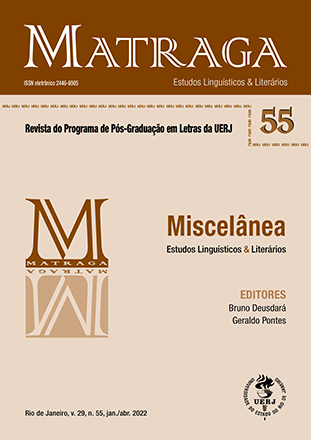An approach to carnivalization in political memes
DOI:
https://doi.org/10.12957/matraga.2022.61345Keywords:
Dialogism, Carnivalization, Laughter, Memes, Facebook.Abstract
This article analyzes the carnivalization (Bakhtin 1996, 2018) in political memes that circulate on the internet. It starts from the hypothesis that the chosen genre is characterized by the inversion of the “natural logic” of the objects, by the “upside down” representation of facts from “official life” and by the carnivalesque laughter. The theoretical-methodological basis is found in Bakhtin (1996, 2016, 2018), Medvedev (2019) and Voloshinov (2013, 2017). The material to be used in this study consists of four memes collected on Facebook, between 2019 and 2020. The article examines the relationship between the language of the public square carnival and that used in memes; the process of carnivalization and the type of laughter present in the memes. The results show that political memes make use of unpolished ways of saying, of questioning that signal the lowering of the other, through criticism or debauchery, stirring the laughter of internet users who share the same critical position of the creator of the meme
Downloads
Downloads
Published
How to Cite
Issue
Section
License
Authorization
Matraga – Scientific Journal of the Post-graduate Program in Arts and Humanities of UERJ is authorized to publish the article submitted here, if it is accepted for online publication. It is attested that the contribution is original, that it is not being submitted to another publisher for publication, and that this statement is the expression of truth.
The works published in Matraga's virtual space – Scientific Journal of the Post-graduate Program in Arts and Humanities of UERJ will be automatically transferred, and your copyright is reserved to Matraga. Its reproduction, in whole or in part, is conditional on the citation of the authors and the data of the publication.

Matraga uses license Creative Commons - Attribution-Non-Commercial 4.0 International.





